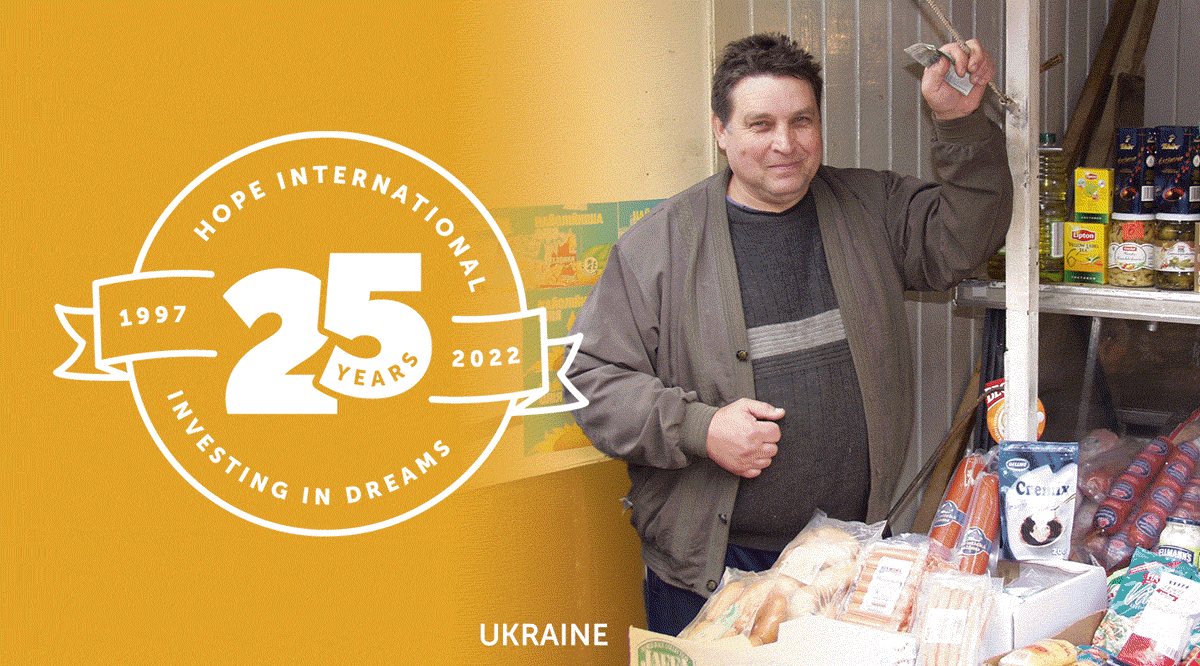This year marks HOPE International’s 25th anniversary, and we’re taking the opportunity to look back, reflect, and celebrate the Lord’s faithfulness. As we consider the story of HOPE, there are certain times that stand out as being pivotal turning points—moments that made a difference in how HOPE serves men and women around the world. Here are five of those break-out moments:
Learning to listen well—1997
In the early 1990s, Jeff Rutt traveled with his church numerous times to Zaporizhzhia, Ukraine, transporting containers of food, clothing, and medical supplies for people there. After several of these visits, a local pastor pulled Jeff aside and told him honestly that the well-intentioned shipments were doing more harm than good, depressing local industry and initiative. The pastor told Jeff that instead of handouts, his community needed a hand up.
HOPE International was born when Jeff discovered the concept of microfinance, then a little-known strategy for poverty alleviation.
Today, we continue to remember this early lesson about the crucial importance of asking for feedback, listening, honoring the experience of those we serve, and adjusting plans to serve well.
For instance, when coffee farmers in Burundi shared that they had no way to invest in improving their farms, HOPE Burundi responded, establishing a new partnership with Plant With Purpose and offering opportunities for specialized agricultural training as well as loans.
Video: learn more about how listening made an impact in HOPE’s origin story.
Reaching (more) underserved families—2007
For nearly 10 years, HOPE focused on offering discipleship, training, savings services, and loans to families living in poverty through microfinance institutions. But in 2007, the archbishop of Anglican Church of Rwanda came to HOPE, expressing a concern for families he saw still suffering in his country—and a deep conviction of the Church’s call to respond. His question was clear: How can we make sure that no one is getting left behind?
The archbishop’s letter led HOPE to explore a new model: savings groups. Rather than being housed in a financial institution, savings groups are a ministry of local churches, and the model’s flexibility means that each group can be adapted to its members.
Since then, 1.4 million people across the network have found Christ-centered community and accessed a safe place to save as part of a savings group. The savings group model has also provided an avenue for HOPE to equip the Church, a commitment that lies at the core of our heart and mission.
Video: explore how HOPE partners with churches to fight poverty.
Keeping Christ at the center—2008
Peter Greer, HOPE’s president and CEO, tells a story about a time when HOPE had the opportunity to receive significant funding from the charitable arm of a large corporation. The only catch was that, because the company was publicly traded, it couldn’t support an organization so overtly faith-based. Could HOPE tone down its Christ-centered mission?
This led to grounding dialogue about HOPE’s mission—and the potential to drift from it.
Ultimately, leadership discerned that Christ is at the center of HOPE’s work, and without Him, the organization would drift from its mission to “proclaim and live the Gospel.”
Today, remaining mission true allows HOPE to come alongside families to fight the impact of poverty holistically—addressing not just the material effects of poverty but also the social, personal, and spiritual.
See what discipleship looks like at HOPE.
Not going it alone—2005, 2018
There’s a proverb that says, “If you want to go fast, go alone—but if you want to go far, go together.”
At HOPE, we’ve taken this wisdom to heart. Around the same time that HOPE reached a point when growth was possible, we also realized that we didn’t want expansion to come at the cost of competing with or even harming other ministries doing similar work. Instead, we wanted to prioritize building the Kingdom more than building HOPE.
Beginning in 2005, like-minded organizations offering Christ-centered financial services—including the Center for Community Transformation in the Philippines, Esperanza International in the Dominican Republic, Invest-Credit in Moldova, ROMCOM in Romania, and Urwego Bank in Rwanda—joined as members of the HOPE network. Together, these microfinance institutions can share resources, learn from each other, and expand their services.
Then, another pivotal moment of collaboration occurred in 2018, when HOPE launched SG Multiply, an initiative to expand the reach and impact of church-centered savings groups. Again, we didn’t want to keep the savings group model for ourselves but hoped to share it with other organizations seeking to integrate savings groups into their ministry model. Four years later, we’ve partnered with 11 church networks and organizations in eight countries, equipping them to implement and scale savings group program in their contexts.
Learn more about the relationship between HOPE and one of our SG Multiply partners, Compassion International.
Moving to the margins—2021
HOPE’s mission has always centered on reaching the underserved—particularly men and women who live in poverty and are excluded from the formal banking system as a result. But over the years, global staff serving across the network have been looking within their own communities and seeing neighbors who are experiencing poverty but are even more so being pushed to the margins of society—those who are immigrants or refugees, are members of a minority ethnic group, or experience physical disabilities, for instance.
Feeling called to respond, staff members, along with local churches, asked how HOPE could be a part of that. Today, global staff and local churches have led the way in serving marginalized or disenfranchised groups of people. Inspired by their example, HOPE has made expanding our boundaries a priority, seeking to reach 20 new frontier communities by 2025.

















You are a blessing. Your work touches God’s heart. May the almighty God help you to accomplish more than you have ever seen of heard off. All the best in your endeavors. Love from Tanzania